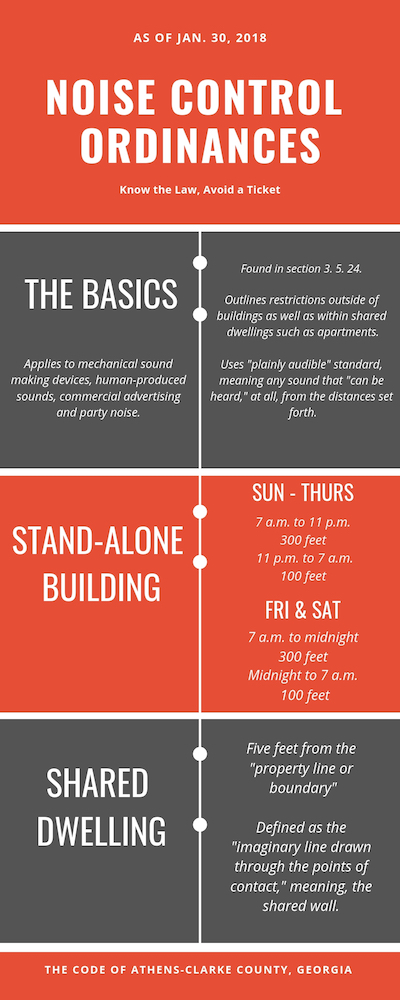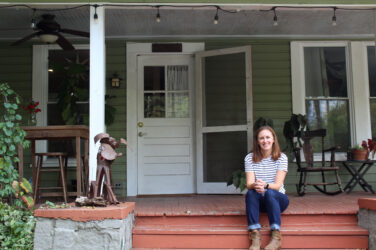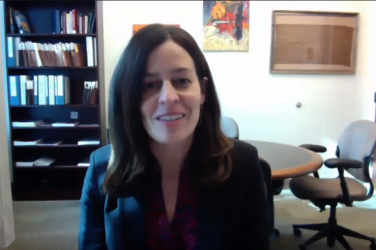Athens-Clarke County operates under strict noise control ordinances. In the past, officers have been able to exercise some discretion when it came to the enforcement of these ordinances and often gave warnings before issuing a ticket. Because of the changing composition of the Athens-Clarke County Police Department, this policy may not continue. Therefore, it is important to be familiar with these ordinances—and gather a few tips for living under them—to avoid a penalty.
“We’re kind of going through a process here of changing from one chief to another chief,” Geof Gilland, Public Information Officer for ACCPD, said. “Under our previous chief, we would give warnings. I’m not exactly sure whether a warning system is in effect or whether, if an officer shows up, you’re going to get a ticket.”
Why It’s Newsworthy: Because of the uncertainty surrounding how noise ordinance violations are going to be handled in the new administration, it is important for residents to understand the laws under which they are bound.
Contained within Section 3. 5. 24. of the Code of Athens-Clarke County, Georgia, the noise control ordinance distinguishes between time of day and type of residence and was last amended in January. The infographic below outlines the specific parameters, as well as the “plainly audible” standard that is used.

“It is a very restrictive ordinance that was put into place,” Gilland said. “If you lived in a residence hall or a dorm, noise carries so easily through those walls and any type of music that is played at a moderate volume could possibly fall under this ordinance.”
At the current standard, violating the county’s noise control laws is easy to do. Because of this, Gilland suggests another approach to dealing with the restrictive code.
“One of the things we suggest is, if you’re going to have a get together…Go meet your neighbors,” Gilland said. “Say hello to them and let them know what’s going on. Give them a contact point or a contact person and say ‘Look, if it gets too loud, come see me.'”
Though he acknowledges that citizens would be well within their rights to contact authorities if a noise conflict becomes difficult to resolve, Gilland also said that it often works better when such issues are handled without police intervention.
“Within reason, people should try to work out their differences as best as they can between themselves,” Gilland said. “I think in general, what I’ve noticed over the years, is that people can work out these things amongst themselves far better than an officer can.”
Jordan Brower, a marketing major at the University of Georgia and local hip-hop artist, lives in a student apartment complex in downtown Athens. In making his bass-heavy tracks, Brower has noticed that sound can be an issue for neighbors in general, but, “especially in college apartments where the walls aren’t really made to be sound suppressing.”
“Even if it’s on low, my neighbor will literally just bang on my wall. They don’t come and knock on my door and ask me to stop, they just keep hitting the wall,” Brower said, also noting that getting to know one’s neighbors could be helpful in the situation. “If they came and asked me to stop, I would stop or turn it down.”
Turning to another situation in which he’s encountered the county’s noise ordinances, Brower explained one successful tactic he’s used to avoid violation—a tactic very similar to the earlier method detailed by Gilland.
“We had a party with a couple of rappers, and we had it at a friend’s house behind Mama’s Boy. Because of the time we were going at, we had to go to the neighbors, knock on their doors and ask them to not worry and to call us if they had any complaints,” Brower said. “One of them got a little upset at one point, but then they came and joined the party and they had fun.”
Of course, this result isn’t always guaranteed. Using what he has learned when creating music, Brower had another tip to avoid noise ordinance violation—pointing specifically to one aspect of sound that can be a likely culprit.
“Turn the bass down,” Brower said. “Bass sounds hit the back wall and side walls and travel through the walls… you can hear [it] even if music isn’t necessarily loud.”
Emma Korstanje is a senior journalism major within the Grady College of Journalism and Mass Communication.







